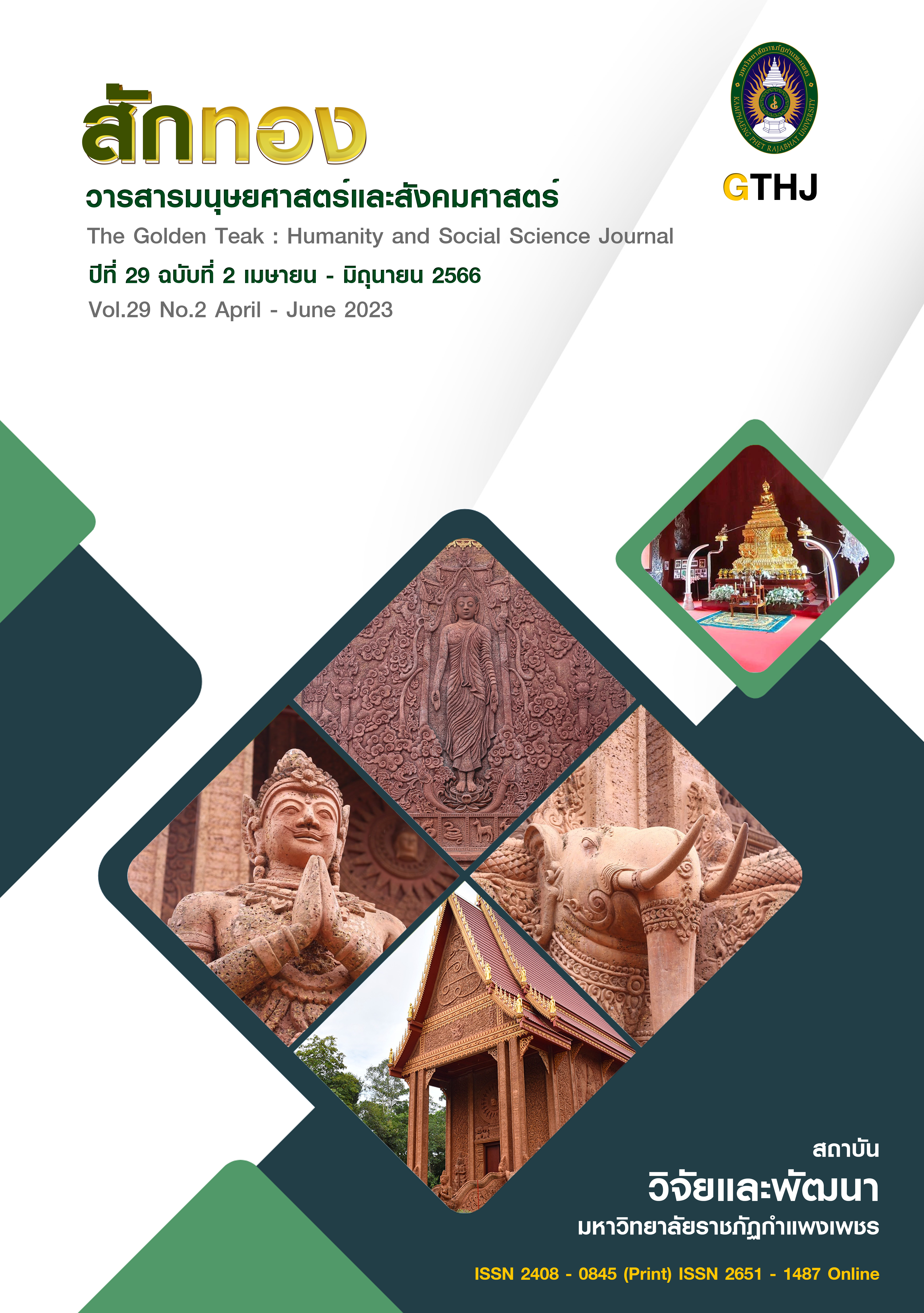Review of Concepts and Studies on Urban Water Security
Main Article Content
Abstract
The continued increase in the urban population results in the need for a large amount of water while the water supply is limited. The problem of water insecurity is a new threat that affects human well-being and ecosystems. Currently, many countries around the world are experiencing and tend to increase in violence. The water security concept is one approach to help manage water and create fairness for water users in all sectors. Especially in urban areas where water demand is high for the consumption of the population and other activities such as tourism, industry, etc. This article attempts to explain the origin and importance of the concept of water security and its application. In urban areas where the dynamics and dimensions of water use are varied It is likely to be affected by high levels of water insecurity. The aforementioned review of the literature indicates that Thailand lacks research on water security at the urban level. And the concept of water security is an interesting new paradigm in the study of urban water use in Thailand that is appropriate for many situations.
Article Details

This work is licensed under a Creative Commons Attribution-NonCommercial-NoDerivatives 4.0 International License.
บทความที่ได้รับการตีพิมพ์เป็นลิขสิทธิ์ของวารสาร สักทอง : วารสารมนุษยศาสตร์และสังคมศาสตร์ สถาบันวิจัยและพัฒนา มหาวิทยาลับราชภัฏกำแพงเพชร
ข้อคิดเห็นใดๆ ที่ปรากฎในวารสารเป็นวรรณกรรมของผู้เขียนโดยเฉพาะ ซึ่งมหาวิทยาลัยราชภัฏกำแพงเพชรและบรรณาธิการไม่จำเป็นต้องเห็นด้วย
References
Aboelnga, H.T., Ribbe, L., Frechen, F.B. & Saghir, J. (2019). Urban water security : Definition and assessment framework. Resources, 8(4), 178.
Ainuson, K. G. (2010). Urban water politics and water security in disadvantaged urban communities in Ghana. African Studies Quarterly, 11(4), 59.
Allan, J.V., Kenway, S.J. & Head, B.W. (2018). Urban water security-what does it mean?. Urban Water Journal, 15(9), 899-910.
Asia-Pacific Water Forum. (2007). Asian water development outlook. Philippines : Asian Development Bank.
Asian Development Bank. (2016). Asian water development outlook 2016: Strengthening water security in Asia and the Pacific. Philippines : Asian Development Bank.
Chansanoh & Arpornsilp. (2003). water rights: Decision of the Committee on Economic, Social and Cultural Rights No. 15 on the right to water. Bangkok : Office of the National Human Rights Commission. [In Thai]
Cook, C. & Bakker, K. (2012). Water security : Debating an emerging paradigm. Global environmental change, 22(1), 94-102.
Díaz-Caravantes, R.E., Zuniga-Teran, A., Martín, F., Bernabeu, M., Stoker, P. & Scott, C. (2020). Urban water security: a comparative study of cities in the arid Americas. Environment and Urbanization, 32(1), 275-294.
Garrick, D. & Hall, J.W. (2014). Water security and society: risks, metrics, and pathways. Annual Review of Environment and Resources, 39, 611-639.
Gerlak, A.K., House-Peters, L., Varady, R.G., Albrecht, T., Zúñiga-Terán, A., de Grenade, R.R. & Scott, C. A. (2018). Water security: A review of place-based research. Environmental Science & Policy, 82, 79-89.
Grey, D. & Sadoff, C.W. (2007). Sink or swim? Water security for growth and development. Water policy, 9(6), 545-571.
Hallegatte, S.C., Green, R.J. Nicholls. & J. Corfee-Morlot. (2013). “Future flood losses in major coastal cities.” Nat. Clim. Change, 3(9), 802–806.
Hall, J. & Borgomeo, E. (2013). Risk-based principles for defining and managing water security. Philosophical Transactions of the Royal Society A: Mathematical, Physical and Engineering Sciences, 371.
Jaramillo, P. & Nazemi, A. (2018). Assessing urban water security under changing climate: Challenges and ways forward. Sustainable cities and society, 41, 907-918.
Lautze, J. & Manthrithilake, H. (2012). Water security: old concepts, new package, what value?. Natural resources forum, 36(2), 76-87.
Narain, V., Khan, M.S.A., Sada, R., Singh, S. & Prakash, A. (2013). Urbanization, peri-urban water (in)security and human well-being: A perspective from four south Asian cities. Water Int, 38(7), 930-940.
Nazemi, A. & Madani, K. (2018). Urban water security: emerging discussion and remaining challenges. Sustain. Cities Soc, 41, 925e928.
Sadoff, C.W., Hall, J.W., Grey, D., Aerts, J.C.J.H., Ait-Kadi, M., Brown, C. & Wiberg, D. (2015). Securing water, sustaining growth: Report of the GWP/OECD task force on water security and sustainable growth. Oxford, UK : Univ. of Oxford.
Scott, C.A., Meza, F.J., Varady, R.G., Tiessen, H., McEvoy, J., Garfin, G.M. & Montaña, E. (2013). Water security and adaptive management in the arid Americas. Annals of the Association of American Geographers, 103(2), 280-289.
Sucharit, K., Piumchan, D. & Piyatida, H. (2013). Water Security Index Concept: Thailand Water Use Situation in the context of World and ASEAN. Water Resources System Research Unit, Faculty of Engineering, Chulalongkorn University. Bangkok : Chulalongkorn University. [In Thai]
Koontanakulvong, S. (2015). Climate change and water management planning in Thailand. Water Resources System Research Unit, Faculty of Engineering, Chulalongkorn University. Bangkok : Chulalongkorn University. [In Thai]
Tardieu, E. (2018). Global water security: lessons learnt and long-term implications in France. Global Water Security, 185-215.
UN. (2014). According to the United Nations World urbanization prospects. New York : United Nations University.
UN WATER. (2007). Coping with water scarcity : challenge of the twenty-first century. Prepared for World Water Day.
UN WATER. (2013). Water Security & the Global Water Agenda. United Nations University.
Unesco. (2000). Ministerial Declaration of The Hague on Water Security in the 21st Century. waterlines, 20-23.
Varis, O., Biswas, A.K., Tortajada, C. & Lundqvist, J. (2006). Megacities and water management. Water Resources, 22(2), 377-394.
Wheater, H. & Gober, P. (2013). Water security in the Canadian Prairies: science and management challenges. Philosophical Transactions of the Royal Society A : Mathematical, Physical and Engineering Sciences, 371.
Wuysang, J.E., Triweko, R.W. & Yudianto, D. (2016). A Study in developing of urban water security dimension in Indonesia. Indonesia : Universitas Katolik Parahyangan.


